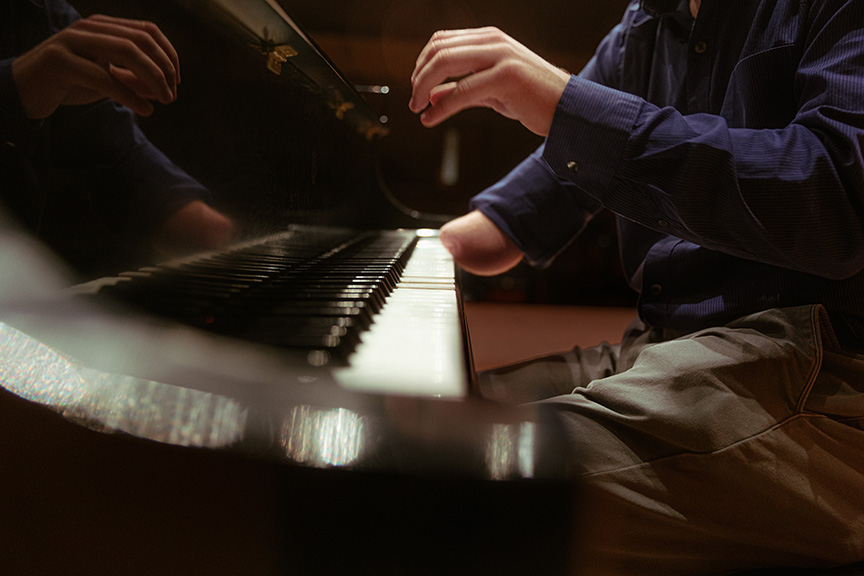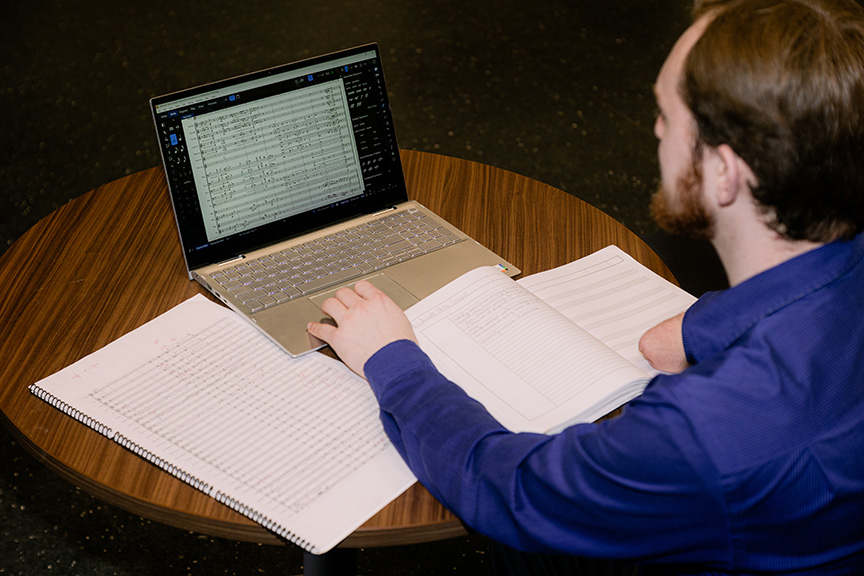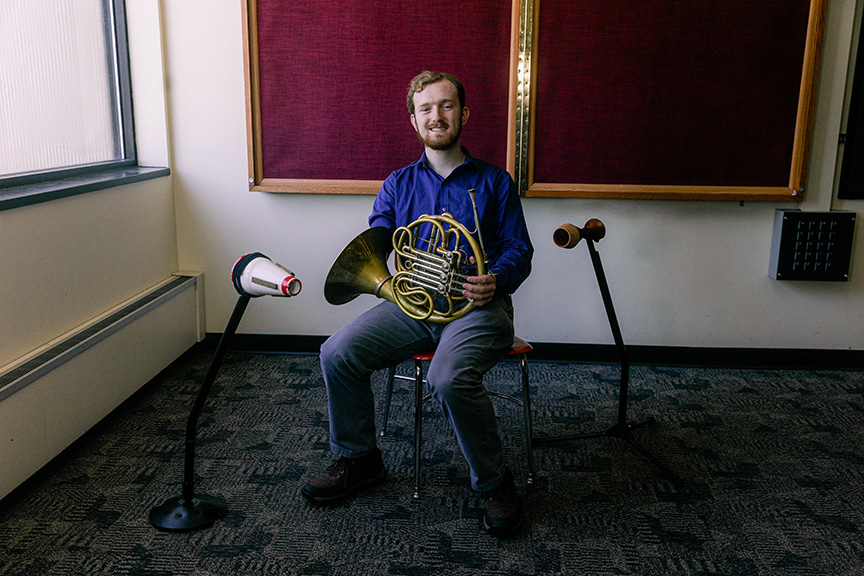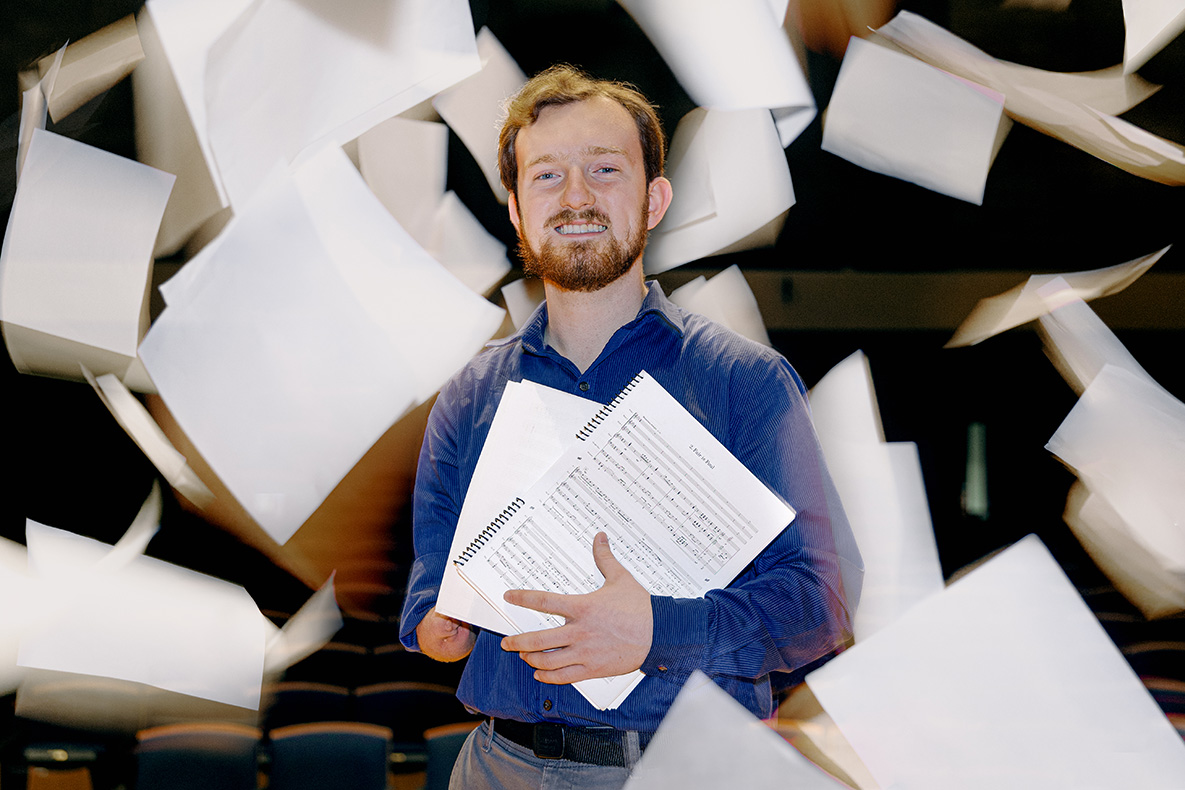In second grade, Jarod Hart’s music teacher invited a ragtime pianist to perform for students at his elementary school in Story City, Iowa. Most of the kids thought the special music program was cool. But for 8-year-old Hart, the pianist ignited his passion for music. Shortly thereafter, he started taking piano lessons.
This story may seem unremarkable until you understand that Hart (’26 music education, composition) was born without a right hand, making his ability to play piano extraordinary. But he and his piano teacher never let Hart’s physical challenges keep him from doing what he loved – making music.
“She’s the one who spurred me into composition because there gets to be a point where you can’t play everything the right hand requires since I don’t have a right hand,” Hart said. “She taught me how to rearrange the music to be able to do more with my left hand. From there, I just said why should I do other people’s music? Why can’t I write my own music? So that’s how I got into writing music.”
Unique double majors

Pursuing music in college was an obvious choice for Hart. Ultimately, he chose to combine his two musical passions, composition and education.
“I have these theories on how to improve writing within music education, so I decided on a dual degree at Iowa State. If the composing doesn’t take off, I can still teach. But I want to use it more for writing quality music for students.”
Hart’s dual emphasis in the music major is especially challenging. According to Iowa State’s current music faculty, he is one of only two students so far to combine music education with composition. This combination requires extra coursework, which extends the time needed to complete the degree. Hart appreciates the department’s support as he navigates this unique journey.
“Iowa State is supportive of a student who has an idea and is passionate about making that idea work. The professors will do their best to make it possible,” he said.
Last fall, Hart pushed his musical boundaries even further and became assistant music director for the Department of Music and Theatre’s production of “Die Fledermaus.” The experience is a highlight in Hart’s Iowa State musical journey.
“Obviously, the students are fabulous and still honing their craft, but to see the way the professors went about working to develop the show was really exciting,” Hart said.
Tight schedule

Hart participates in numerous university ensembles, including marching band, symphonic band, wind ensemble, and orchestra. He’s also active in the French horn and pipe organ studios. But composing music is his top priority.
Hart’s current music catalog contains about 30 compositions. Those pieces include multi-movement works, choir music, a baritone voice solo, piano solos, instrumental chamber music, and full band and orchestra scores.
Christopher Hopkins, professor of music, teaches Hart composition and says he is a prolific composer.
“Each week, Jarod brings in lots of new writing into his composition lessons. It’s a challenge to review it all together within the hour-long meeting … but we proceed with high energy because there is no other choice. Next week there will be a lot more yet again,” Hopkins said.
Hart published his first composition during his sophomore year and now has a total of seven published works. Recently, he released a piece for beginning bands, in collaboration with Michael Golemo, University Professor of music and director of bands.
“That was really fun,” Hart said. “From what I hear, it’s been selling quite nicely.”
Grand finale
Although Hart has a year left at Iowa State, he is already immersed in his senior recital performance – a showcase of original music compositions. He considered different ways to approach this project and landed on a one-act musical.
“That’s scary to say you should write a one-act musical in less than a year,” Hart said. “For perspective, most professional musicals have a creative team of five to six people and take about two years to develop.”
But Hart got to work immediately, first contemplating a plot. He decided to approach his 17-year-old brother, Luccas, who is a prolific creative writer. Luccas offered Jarod five original stories to review.
“I read through all of them, but there was one that stuck out to me and it’s ‘Little Miss Apocalypse,’” Hart said. “We talked it over and he agreed to help write the script and co-write the lyrics with me and then I would be responsible for all of the music.”
“That’s scary to say you should write a one-act musical in less than a year. For perspective, most professional musicals have a creative team of five to six people and take about two years to develop.”
The musical features four actors and 12 songs. It takes place when the Earth’s ozone layer is depleted, requiring all humans to live in underground bunkers. The story follows a father and his daughter, who have never lived above ground. One day, the daughter learns about a beauty pageant called Little Miss Apocalypse and she wants to enter, but her father forbids it. She runs away, and calamity ensues.
The Hart brothers have worked tirelessly over the past several months to finish the musical. The music is complete, the actors have their parts, and rehearsals will begin soon. “Little Miss Apocalypse” will debut at Hart’s senior recital in fall 2025.
A bright future
Talent and determination have buoyed Hart while at Iowa State. Those same attributes will sustain him as he follows his career path, whatever that may be.
“If I can write for the educational market, that would be wonderful. But it takes a lot of work to put out enough stuff to have that be a sustainable career,” Hart said. His ultimate goal is to compose music for Broadway musicals.
“I would love to be a Broadway composer,” Hart said. “To have already written two musicals at age 21 is certainly a grand start.”
Sidebar: Necessity is the ‘father’ of invention
Jarod Hart’s love of music began with the piano. But he’s also proficient at French horn and trumpet.
As a 5th grade band student, Hart chose to play French horn. It was a logical choice because he could play the keys with his left hand and stabilize the horn’s bell with his right shoulder.
“To middle school me, that was a great choice,” Hart said. “But you get up to the higher levels and you learn that the hand being in the bell impacts the sound waves. I can’t do that.”
Enter Hart’s dad, Eric. Together, the two devised a faux hand-like device made from wine corks and nails that slides into the horn’s bell.

“I put that in the bell and suddenly it fits the wave form much nicer and it creates the authentic French horn sound,” Hart said.
Similarly, Hart has difficulties attaching a mute to his French horn.
“Once again, I went to my dad. He’s a very handy guy,” Hart said.
The Harts solved the mute issue by adding PVC pipe to an old microphone stand.

“It holds the mute in the air, and I just push it into the bell and I’m off to the races,” Hart said.
Hart has never allowed his physical limitations to slow him down, certainly not when it comes to music.
“After a certain point, you just run into an issue and go, huh, that’s a thing,” Hart said. “I guess I’ll find a new way around it.”
